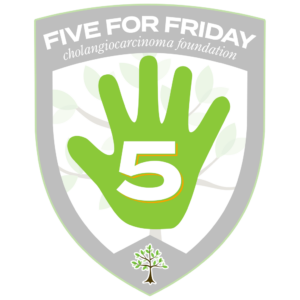
5 Trials at ASCO 2022
Home / Blog / [wpbb post:title]
The American Society of Clinical Oncology (ASCO) meeting took place in Chicago the first week of June. The Foundation provided an information booth and participated in premier scientific events for oncology professionals, patient advocates, industry representatives, and major media outlets worldwide. Some of the latest cholangiocarcinoma research studies are: 

Patient-reported outcomes for the phase 3 TOPAZ-1 study of durvalumab plus gemcitabine and cisplatin in advanced biliary tract cancer.
Short Title: TOPAZ-1 Trial: Patient-reported outcomes
This is the first randomized multi-center phase III trial to evaluate the efficacy and safety of using durvalumab, a PD-L1 inhibitor, versus placebo combined with gemcitabine cisplatin followed by maintenance durvalumab or placebo till progression as first-line therapy.
Patient-reported outcomes are assessed by measuring the time between treatment initiation till disease progression or clinical deterioration as well as by gathering patients’ responses to several validated surveys, including the European Organisation for Research and Treatment of Cancer 30-item Quality of Life (QoL) Questionnaire, EORTC QLQ-C30 (C30), and the BTC 21-item module, EORTC QLQ-BIL21 (BIL21).
The TOPAZ-1 trial showed that the addition of durvalumab improved the patients’ survival compared to placebo without causing any significant deterioration in the patients’ quality of life https://ascopubs.org/doi/abs/10.1200/JCO.2022.40.16_suppl.4070?af=R

Regional subgroup analysis of the phase 3 TOPAZ-1 study of durvalumab (D) plus gemcitabine and cisplatin (GC) in advanced biliary tract cancer (BTC).
Short Title: TOPAZ-1 Trial: Regional Subgroup Analysis
This is the first randomized multi-center phase III trial to evaluate the efficacy and safety of using durvalumab, a PD-L1 inhibitor, versus placebo combined with gemcitabine cisplatin followed by maintenance durvalumab or placebo till progression as first-line therapy.
The TOPAZ-1 trial showed that adding durvalumab improved the patients’ survival compared to placebo, especially among patients from Asia. More Country-specific and regional outcomes continue to be explored https://ascopubs.org/doi/abs/10.1200/JCO.2022.40.16_suppl.4075

PROOF 301: A multi-center, open-label, randomized, phase 3 trial of infigratinib versus gemcitabine plus cisplatin in patients with advanced cholangiocarcinoma with an FGFR2 gene fusion/rearrangement.
Short Title: Phase III PROOF 301 for Cholangiocarcinoma
This is the first randomized multi-center phase III trial to evaluate the efficacy and safety of using Infigratinib, an FGFR1-3 inhibitor, versus gemcitabine/cisplatin for unresectable or metastatic cholangiocarcinoma with FGFR2 fusion or rearrangement. 300 patients will be enrolled in this study and will be randomized 2:1 to oral infigratinib 125 mg once daily for the 21 days of a 28-day treatment cycle versus intravenous standard gemcitabine + cisplatin. This trial is currently enrolling. If you are interested in this trial, you can find the list of eligible mutations through these links https://ascopubs.org/doi/abs/10.1200/JCO.2022.40.16_suppl.TPS4171?af=R https://clinicaltrials.gov/ct2/show/NCT03773302

NEO-GAP: A phase II single-arm prospective feasibility study of neoadjuvant gemcitabine/cisplatin/nab-paclitaxel for resectable high-risk intrahepatic cholangiocarcinoma.
Short Title: Neoadjuvant GAP Trial for Intrahepatic Cholangiocarcinoma
This single-arm phase II clinical trial was conducted to evaluate the impact of using gemcitabine/cisplatin/nab-paclitaxel as a neoadjuvant therapy among resectable high-risk intrahepatic cholangiocarcinoma patients defined as tumor size > 5cm, multiple tumors, presence of radiographic major vascular invasion, and lymph node involvement. Among 30 eligible enrolled patients, 23 (77%) underwent surgical resection after completing 4 cycles of neoadjuvant therapy. Only 2patients developed minor postoperative complications. Patients enrolled in this study are still under the follow-up to assess the recurrence-free survival and overall survival rate, and more extensive validation studies are planned. https://ascopubs.org/doi/abs/10.1200/JCO.2022.40.16_suppl.4097?af=R

Phase 1b results of a multi-center, randomized phase 1b/2 study of gemcitabine and cisplatin +/- CPI-613 as first-line therapy for patients with advanced biliary tract cancer (BilT-04).
Short Title: BILT-04 Trial for Biliary Tract Cancer
This is a multi-center, global phase Ib/II trial. In phase Ib, 20 biliary tract cancer patients were enrolled and treated with combined gemcitabine and cisplatin with the addition of CPI-613 [Devimistat]; anti-mitochondrial systemic chemotherapy. The investigators found that the maximum tolerable dose of CPI-613 in the combination regimen is 2000mg/m2 with a 40% overall response rate, 16.3 months median overall survival, and One locally advanced patient underwent surgical resection. Currently, this trial’s randomized phase 2 portion is open and enrolling patients. If you are interested in this trial, you can find the list of eligible mutations through these links https://ascopubs.org/doi/abs/10.1200/JCO.2022.40.16_suppl.4094
https://clinicaltrials.gov/ct2/show/NCT04203160
If you have something you’d like to share, please reach out to Allison Deragon at allison.deragon@cholangiocarcinoma.org.